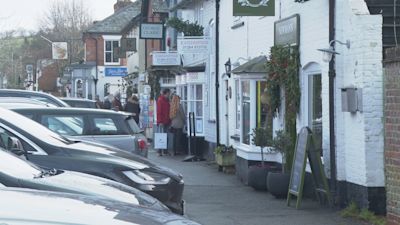'No-one wants to come out': Hospitality venues in the South East see drop in sales and bookings

Some pubs and restaurants in the south east of England say they are struggling again with Christmas bookings being cancelled or postponed due to concerns over the Omicron variant.
Many venues rely on a busy December to keep them afloat during the quieter months of January and February, so a drop in trade is likely to cause even more financial hardship.
In Stockbridge, Hampshire, hospitality owners say they have seen a 'drastic' drop in sales.
Rebekah Razza, Store Manager at Kudos Coffee said: "It's definitely a lot slower in terms of how many people are out and about on the high street and dining in hospitality, as oppose to retail.
"It's very difficult to control staffing levels, asking people to come in, sending people home early, and also knowing how much produce to have in."
UK Hospitality, which represents the trade, predict takings could fall by as much as 40% for an average December, normally the most lucrative month.
Watch: Business owners and managers in Stockbridge say customers seem more reluctant to make bookings
Following Boris Johnson's announcement over Plan B rules, UK Hospitality's Chief Executive said the measures, while appropriate, would risk 'devastating the hospitality sector amid its most important time of the year'.
Ian Hemming, owner of Thyme and Tides said: "Definitely people seem very much more reticent to make any commitments until the last few days.
"Thankfully the last few days have been really busy. We can only hope that with the amount of stock we've got that that carries on through for the next two weeks."
Zak Southward, General Manager of The Greyhound said: "What we've seen is our larger Christmas bookings, Christmas parties, are now being cancelled or postponed.
"We are quite lucky to have a big local following. What we're finding at the moment, is that while we've lost a party of 30 this coming Friday, we are picking up individual bookings, tables of four, which can fill that gap."
Meanwhile in Brighton, Lee Burton from The Dorset says that 'no one wants to come out'.
He said: "Luckily our bookings are still committing to us, but other than that, we've seen a reduction in trade.
"Our midweek have plummeted. Weekends are still okay but there's less people on the streets, everyone is getting scared with the cases [Omicron] increasing massively."
What can be done to lessen the impact of Omicron?
Outlining the plan B measures from Downing Street, the PM said the "single biggest thing that every one of us can do is to get our jabs and, crucially, to get that booster as soon as our turn arrives.
"Let's do everything we can to protect ourselves and our loved ones this winter, and reduce the pressures on our NHS."
He said the government would "constantly monitor the data" but called on everyone to "play your part" and get a booster vaccine when available.
Mr Johnson added: "As soon as it becomes clear that the boosters are capable of holding this Omicron variant and we have boosted enough people to do that job of keeping Omicron in equilibrium, then we will be able to move forward as before."
As the Omicron variant is so new, it is not known how well the current Covid vaccines work against it.
Dr Susan Hopkins, chief medical advisor for the UK Health Security Agency, said "there is emerging laboratory and early clinical evidence to suggest that both vaccine-acquired and naturally acquired immunity against infection is reduced" for the Omicron variant.
However, scientists believe current vaccines and immunity acquired by infection may help to prevent people from becoming seriously ill with Omicron.
Addressing MPs at the same time as Mr Johnson made his Downing Street statement, Mr Javid said manufacturers believe they may have vaccines ready to trial “within weeks” to combat the Omicron variant and "there may be cases where they could be used in emergency situations".